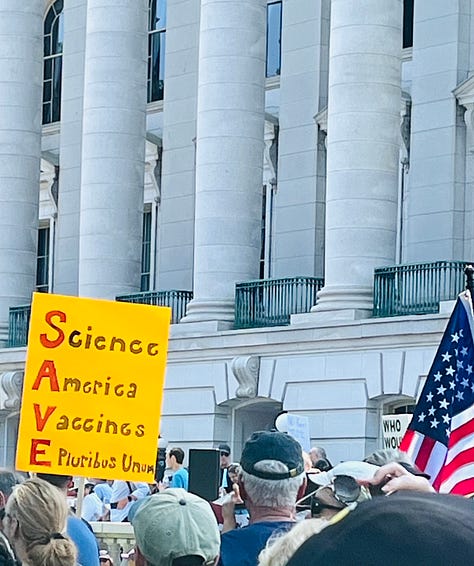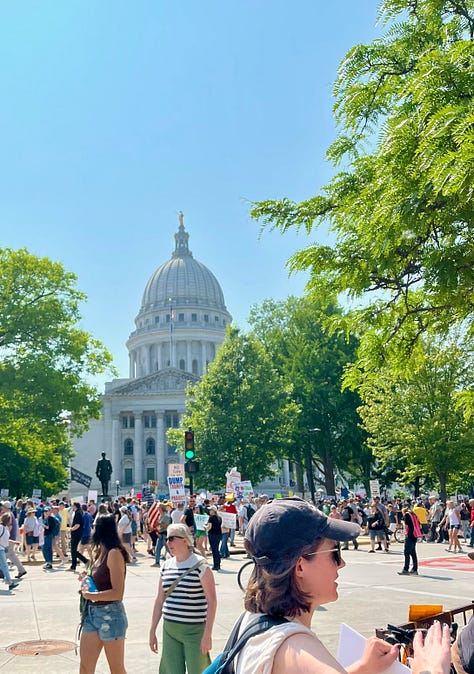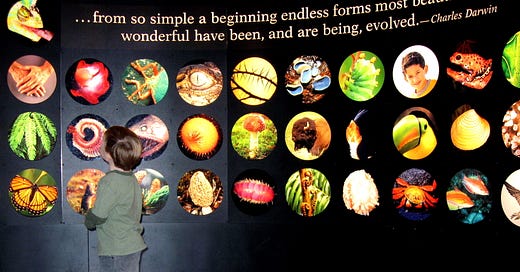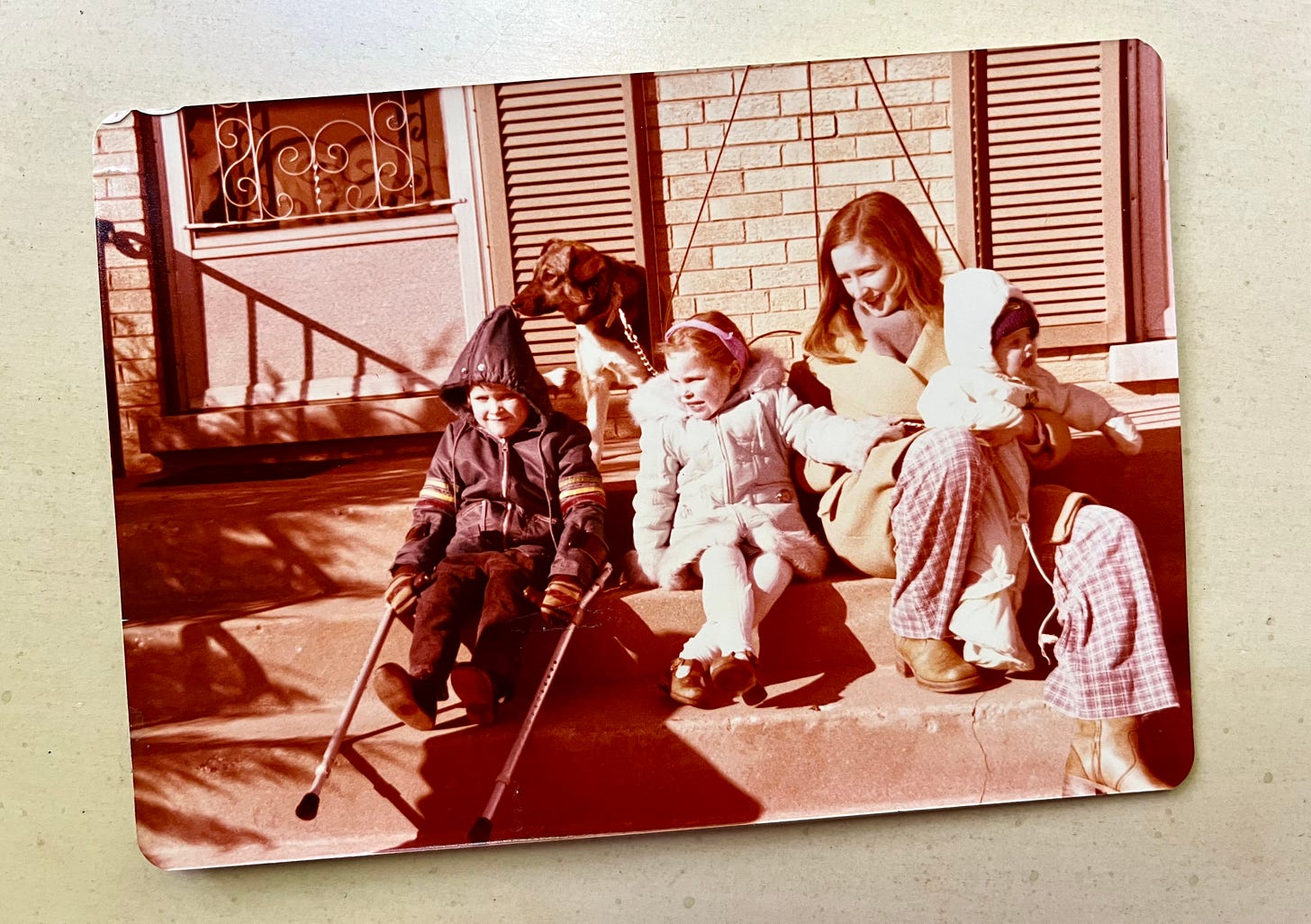Can computers really teach kids better?
Why being a digital native is overrated, life skills should come first, and mentorship matters more than ever
My oldest son Konrad (pictured above, though now he’s 19) has been captivated by prehistoric life since he was a toddler. He just left for a 10-day paleontology fieldwork expedition to collect fossils in Wyoming for University of Wisconsin’s Geology Museum. It’s fascinating how interests are sparked and grow.
I wonder how many kids were inspired to study science after seeing SUE the T. rex1 on display in the Field Museum’s majestic foyer filled with other awe-inspired visitors. You can’t get that feeling through a screen, even a simulated VR one.
There are lots of things you have to experience in real life to truly understand.
“I’m not sure that there’s anything that computers can’t really teach you,” Duolingo CEO Luis von Ahn recently said in a podcast interview.
ICYMI: You can read about the backlash that followed in “Duolingo drama underscores the new corporate balancing act on AI hype” by Katie Notopoulos, senior correspondent at Business Insider.
Von Ahn seems like someone who’s probably nice, just stuck in a tech echo chamber, though he did say something spot-on: “What [most people] don’t understand is how important motivation is.” That’s very true. But do machines motivate people to learn better than people do? That’s not what I’ve seen or experienced.
After having school-aged kids for two decades, the main ways I see kids learning is through:
Engaging in hands-on activities
Having regular interactions with people they know and trust
Being immersed in discussions and casual conversations
Observing new people and places
PLAYING, lots and lots of IMAGINING in LA-LA-LAND TIME (parents need it too)
Von Ahn also pointed out in the podcast how most people don’t appreciate how “sophisticated” Duolingo apps are. Totally true, most people have no idea of the work that goes into any product. Most people also don’t appreciate the level of sophisticated skills, experience, and energies teachers bring into the classroom. When I first started volunteering at my kids’ schools, I was astonished by how challenging and complex teaching work is.
Many types of work are undervalued. Von Ahn suggests that instead of working minimum-wage service jobs, 15- to 20-year-olds would benefit more by spending their time becoming experts in multiple areas by watching video after video. I consider restaurant and retail service jobs essential experiences I want my kids to have, no matter what they end up doing. Everyone should know what it’s like to wait on people and clean up after them.
How Kids Learn: Beyond ABCs and 123s
My mom worked the night shift when I was in kindergarten. After getting my older brothers off to school, she’d try to catch some sleep (if my baby brother allowed it). Meanwhile, PBS kept me company in the morning until it was time for my afternoon class to start.
I learned my ABCs on Sesame Street, seen through my family’s RCA tube TV screen. The phonetic methods suited my brain perfectly, just like the Letter People did in school. I never thought whole-language learning was even possible until I saw a few of my own kids learn that way. (So many things I never thought were possible are not only possible, but naturally so.)
While TV may have taught me how to sound out letters, spending time reading and talking with family, and teachers, and other kids at school is what helped me become fully literate. Similarly, Reader Rabbit, Leap Frog, and Preschool Prep helped teach my kids some things, but not most things, and definitely not everything—or even close.
Kids thrive and learn best in places where people care about them, have their back, and nudge them to do better or correct them when they’re wrong. They learn through group work, even when it’s completely chaotic and dysfunctional (which it usually is). And they learn through doing jobs that are part of living in communities.
Part of the reason I send my kids to school IS to be annoyed.
I want them to learn how to manage the frustration of working with others who think or behave differently from them.
I want them to be surprised to learn that their own way of doing something is only one way and may not be the *best* one.
I want them to fully treasure the times they have teachers or find friends who spark something in them that’ll change them forever, though it may take years before they realize how much it did.
All of these messy, social aspects of learning are even more important in the age of AI than the rote, mechanical learning that an AI-driven education is likely to give.
But AI is a lot cheaper than humans. So it’s not surprising that the current administration is pushing for AI in schools, with the Secretary of Education calling AI learning, starting in preschool, “a wonderful thing!" (And yes, the Secretary did call it A-one instead of A-eye. I don’t like nitpicking mistakes, but this is a serious discussion, and we need leaders capable of engaging in one.)
My kids’ preschools didn’t even regularly use computers in class and I loved that.2
There’s also something unsettling about an AI “teacher” offering cues or rewards perfectly synchronized to optimize your unique abilities and preferences. How does that prepare kids for sharing life with real people?
Screen-free childhoods have become the new virtuous signaling of competitive parenting. Judgement, comparison, and dividing parents into different “types” always sucks no matter the metric. The decision may be different not just for every age but also for each kid, family situation, and type of content and engagement.
I’m imperfectly inconsistent about screen time and struggle to find balance or even know what’s best to do. A lot depends on what their friends are doing, especially as they get older. Parents need grace, tech needs regulation, and kids need space, time, and support to safely learn how to live in the real world around real people.
Tech skills vs. life skills
From the time my oldest first entered kindergarten 20 years ago to today, many parents and schools have felt pressured to introduce tech earlier to prepare kids for the world they’ll need to navigate. There’s a sense that if they’re not taught young, they’ll never catch on. That seems counterintuitive from what I’ve seen happen.
Yes, technical skills need to be learned, but so do life skills. And tech skills are easier to self-teach and catch-up on than life skills.
Most tech is designed to be intuitive for solo users and made to feel “natural.”
~ Contrast learning tech with learning something as “natural” as breastfeeding ~
We brought our first baby home from the hospital 25 years ago. Had my mom not been there to show me what to do, I never would’ve figured out how to nurse or care for our tiny baby. No human instinct told me to angle my aching nipple at a very specific angle to help my baby latch on. Soaking my boob in a bucket of warm water to help unplug a duct wouldn’t have come to mind. And no AI assistant could build my confidence as a parent and make me feel less alone with a newborn, being there with a helping hand.
Unlike tech, nursing and newborn care are designed to be learned in a social context. New parents require help just like babies do and just like everyone else. So instead of worrying so much about socializing people in tech, we should focus on socializing people in living. And instead of teaching specific technologies, we should teach kids how to critically and ethically think about using evolving technologies.
Although tech creates infinite opportunities for connections with others, it requires no real presence of anyone. It’s designed to be addictive, pulling you in and keeping you there until you’ve mastered it (and it’s mastered you).
The advantages of being a digital native seem far overstated. I don’t think whether my kids learned [insert any device, platform, or technology] at age two or twenty-two would substantially change their ability to become skilled users. The tradeoff of focusing on tech skills at younger ages might mean missing out on developing life skills that are needed at crucial moments that come and go so quickly, and have no replay feature built in.
Mentorship matters
Although being a self-taught prodigy may be possible in theory, most everyone needs mentors to teach them the ropes, offer feedback and support, and nudge them to grow and expand.
My older kids have each had teachers who became life-changing mentors, encouraging their passions and helping them discover ways to develop and share their unique talents. Konrad’s high school teacher gave him fossils to work on over the summer. (You don't just dig up a fossil and voilà.)
The pandemic and WFH shift have created mentoring voids in the workforce. Junior workers are missing out on having learning support. Older workers are missing out on their youthful perspectives. Learning always goes both ways.
My dad died in 2008 and didn’t own a cell phone. When asked why, he’d say that if he did, people running the store when he was out would call him and ask what to do rather than learning to figure it out themselves. He trained them when he was there, and knew they were capable. If they made a mistake, then they’d learn. Preparing the next generation is part of the life cycle. But you can’t wait too long to do it, and you have to let others have chances to lead so they can learn.
Dad planned on retiring at 60. He didn’t plan on dying just after, but he was one of those people I’m sure everyone knows who had a solid, grounded acceptance of death. Maybe he developed it after his Irish twin sister died when he was three. Or maybe it was his rational-thinking nature combined with his Catholic faith.
At Dad’s wake, his junior colleague introduced himself to me. He’d known me from stories Dad shared with him, all braggy and likely half true at most. I’d heard his name in passing, but Dad never talked much about work with me. The man, probably in his early thirties, like me at the time, was in tears, shocked like everyone else. Dad was known for his quick pace, always two steps ahead with the energy and plans of two people in one. His sudden death was startling.
It’s odd mourning a loved one with a stranger also mourning that same person. You feel an immediate connection that makes them feel like someone you already know. Talking with him and hearing about the kind of mentor Dad was to him gave me a chance to see another side of Dad that I never knew.
Moving into my fifties, I’m thinking of my dad and growing to appreciate how important it is to let younger people take the reins. Let go. Give them a chance and believe in them. Maybe this won’t be my last decade, but even if it isn’t, I want to grow old generously helping and handing off, while staying hopeful about their whole new world to come.



I went to the ‘No Kings’ rally in Madison, WI with my college-aged son. The mood was subdued, given the tragic events happening in Minnesota earlier that day. Such a small thing, but it felt like something to do to say no more.
The ramped-up deportations and anti-immigrant rhetoric feel sickening; using people when you need them and then, on a whim, randomly disappearing individuals, uprooting lives, and intentionally causing widespread fear. Saying no more to the irresponsible dismantling of public health and proposed healthcare cuts were other reasons I wanted to be there.
I’ve been a voting adult for more than three decades and have long wondered: Why does it seem impossible for a politician to ask anything from anyone they’re hoping to get a vote from? Saying no more is not enough. People like me saying yes to sacrificing something for the greater good is desperately needed. But who will dare ask?
What’s Next? The fashion post with my daughter Nora will come soon. She’s been busy this month—getting engaged!!! My husband and I are OVERJOYED with the news. “It’s already like she’s family,” our youngest says of his future sister-in-law.
I’m also planning a series of interviews with writers of photography Substack newsletters. As life’s pace feels faster, I find myself more drawn to the experience of looking at single photographs. I'm curious to learn more about the people who create and curate them, and I'm excited because I think most everyone could also find inspiration and grounding in the images they share.
The first interview will be with
, author of Digest, and fellow Wisconsinite! Check out this interview in a recent newsletter of his to learn about reclaiming attention: “Notice What You Notice.” (I signed up for one of the workshops linked at the bottom.)
I found this Center for Humane Technology podcast insightful.
Here’s a snippet summary of what Professor Michael Sandel advises:
Don’t trust the high priests of technology who say, “AI is coming, it’s inevitable, and there’s nothing we need to do but figure out how to live with whatever happens.” Instead, he argues that we should reclaim questions about what technology should used be for and have a robust public debate over how to direct technological innovation.
Ground-up debates involving local schools, communities, and statewide leaders seem more likely to lead to robust debate. That’s why the provision in the administration’s budget reconciliation bill, which would prevent states from regulating AI, is so troubling. Bipartisan support to remove the provision is growing, but it’s unclear if that’ll be enough. It’s not too late to reach out to elected officials who will be voting on the bill.
Since 2018, Máximo, a titanosaur cast, has been on display in Chicago’s Field Museum lobby. Here’s a video of its arrival and assembly. SUE the T. rex was moved to another display site within the museum. This year is the called the Summer of SUE, to celebrate 25 years since the T. rex was first on display. We’re planning a visit in August.
Except for our youngest, who got zoomed out in preschool during the pandemic.









